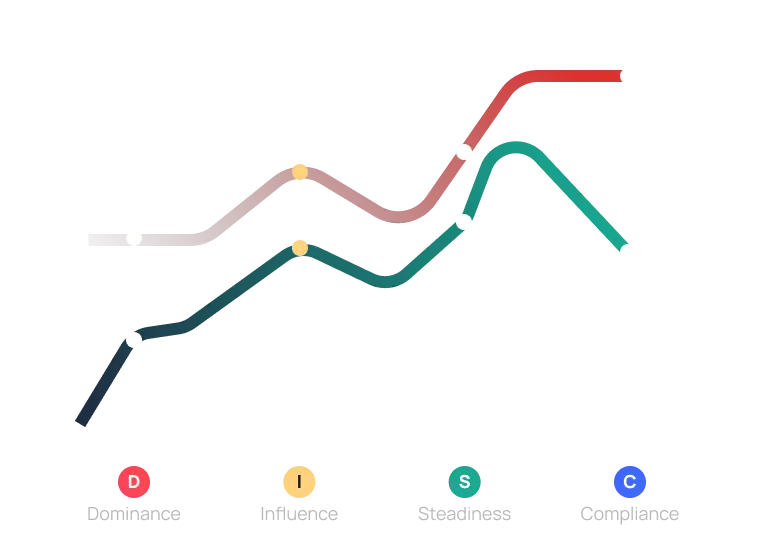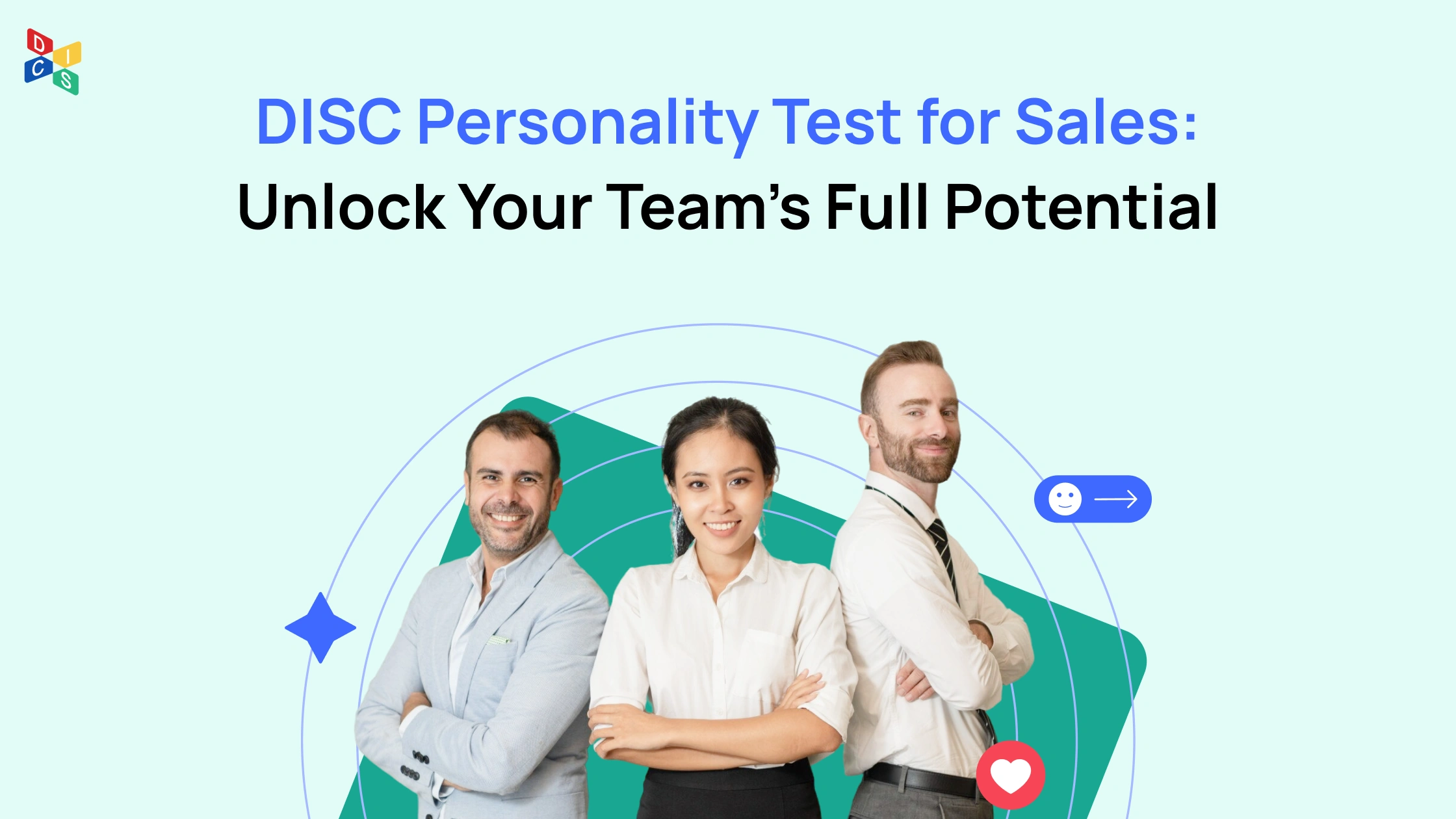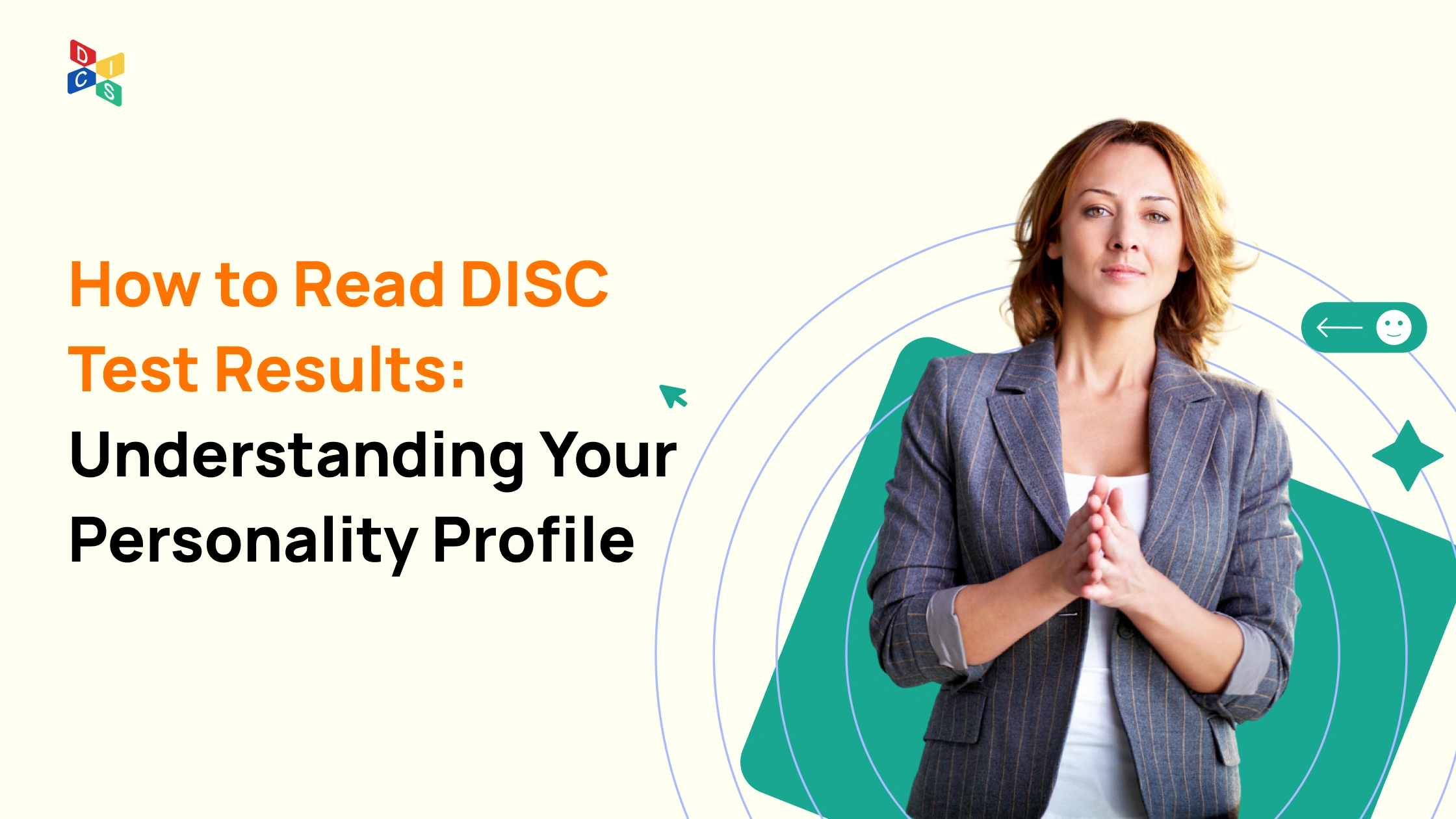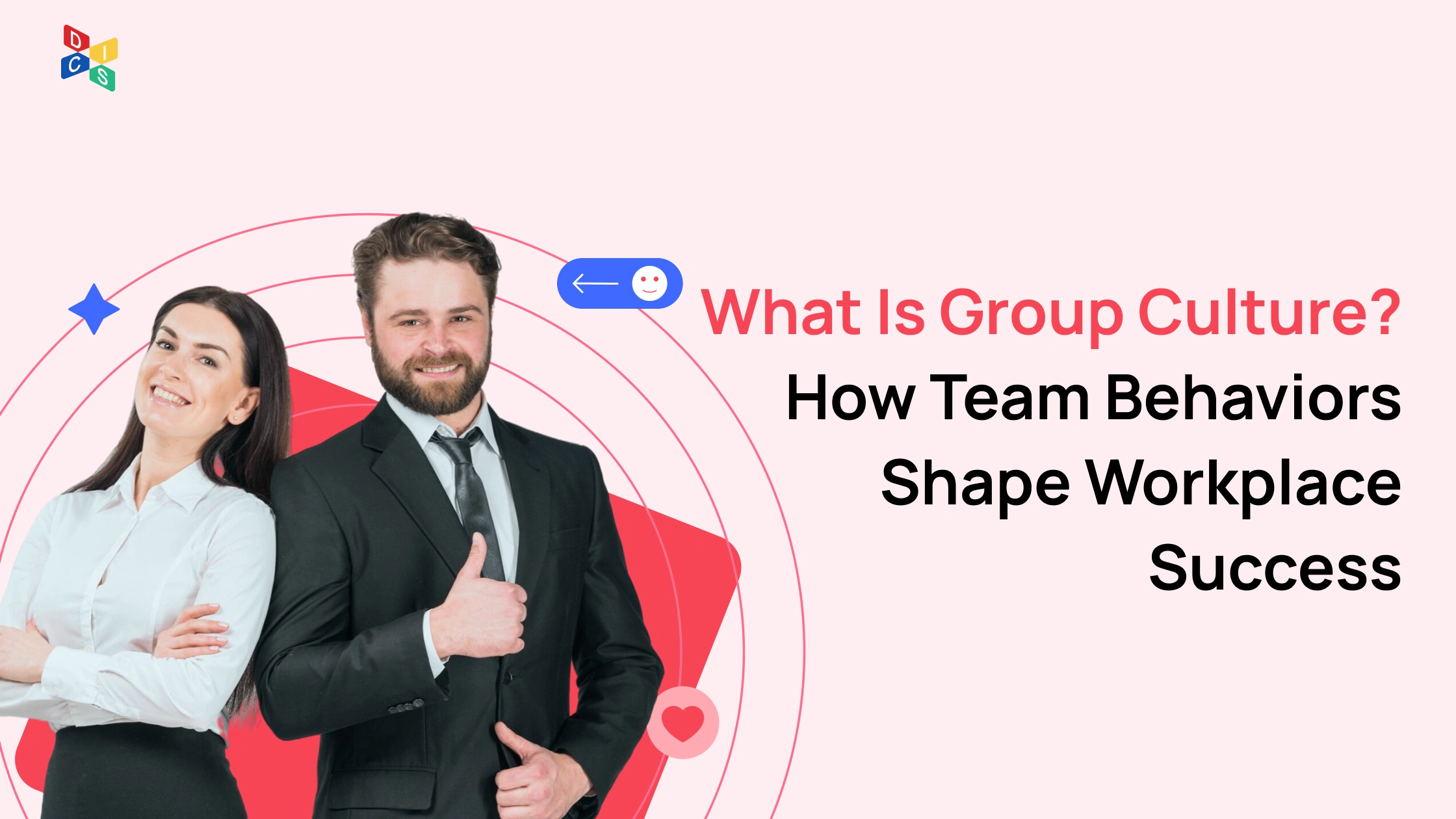Table of content
Enneagram vs DISC Test: Which Personality Test Is Right for You?
Discover key differences between Enneagram vs DISC tests. Find out which assessment is right for your self-discovery, team dynamics, or leadership training goals.
When it comes to understanding personality, both the Enneagram and the DISC provide useful insights, but they serve different functions. In this article, we will look at the key distinctions between the Enneagram vs DISC systems and compare these two important tools. This allows you to determine which tool will best assist your personal or professional development goals.
What Is the Enneagram Personality System?
The Enneagram Personality System is a model that categorizes people into 9 core personality types, each representing a distinct way of thinking, feeling, and behaving. Unlike behavior-focused assessments like the DISC, the Enneagram investigates the underlying motivations and fears that impact how people perceive the world.
Each of the nine Enneagram types reflects a distinct worldview that is shaped by its understanding of what it requires to survive and thrive. Here’s a quick overview of the nine Enneagram types:
- Type One - The Reformer: self-controlled, goal-oriented, idealistic, and principled.
- Type Two - The Helper: possessive, friendly, and people-pleasing.
- Type Three - The Achiever: flexible, exceptional, motivated, and mindful of one's appearance.
- Type Four - The Individualist: unpredictable, dramatic, expressive, and self-centered.
- Type Five - The Investigator: observant, creative, reticent, and solitary.
- Type Six - The Loyalist: social, accountable, nervous, and suspicious.
- Type Seven - The Enthusiast: impulsive, adaptable, acquisitive, and scattered.
- Type Eight - The Challenger: courageous, decisive, determined, and combative.
- Type Nine - The Peacemaker: open-minded, comforting, relaxed, and accepting.
In addition to the nine core types, the Enneagram introduces the concept of “wings” - the two types adjacent to your primary type on the Enneagram circle. It introduces complexity by showing how surrounding patterns have a minor influence on an individual's core kind. Due to its dynamic nature, the Enneagram is highly beneficial for spiritual exploration and long-term personal development. The depth of internal motivation that sets the Enneagram apart from the DISC is what makes it unique.
What Is the DISC Personality Assessment?
The DISC personality test is a behavior-based examination that categorizes individuals into four primary styles. This is effective at offering concise, useful insights on workplace dynamics and communication styles:
- D-Dominance: People with high D traits are usually straightforward, determined, goal-oriented, and like a challenge. They are problem solvers who enjoy taking initiative and doing tasks quickly.
- I-Influence: People with high I are friendly, energetic, upbeat, and convincing. They tend to be outspoken communicators, love interacting with others, and are excellent at inspiring others.
- S-Steadiness: People with a high S are dependable, cooperative, patient, and supportive. They appreciate stability and harmony and are frequently good team players and listeners.
- C-Compliance: People with a high C are analytical, exact, meticulous, and quality and accuracy-focused. They are logical thinkers who prefer to base their conclusions on information and facts.
While the Enneagram explores core motivations and internal dynamics, the DISC model focuses more on observable behaviors and outward communication styles.
It is how individuals communicate, respond to challenges, and work within teams. Because of this behavioral focus, DISC becomes an immediately practical tool in workplace environments..
Enneagram vs DISC: A Comparative Analysis
While both the Enneagram vs DISC personality test are important tools for personal and professional development, they serve distinct functions and are founded on quite different principles. Comparing the two clarifies not only what they measure but also how and where they might be applied most effectively.
| Feature | Enneagram | DISC |
| Core Focus | Motivation, fear, and emotional patterns | Behavior, communication, and response to the environment |
| Number of Types | 9 types with wings, subtypes | 4 styles (D, I, S, C) with blends |
| Best For | Self-awareness, growth, therapy, relationships | Workplace performance, leadership, teamwork |
| Depth | Complex, introspective, layered | Simple, fast, and easy to apply |
| Personality Flexibility | More fixed and internal | Can shift based on roles or situations |
| Application Style | Reflective and inner-focused | Actionable and external-focused |
| Popular In | Coaching, counseling, and spiritual circles | HR, training, business development |
Core Focus
The most important difference between these two common frameworks is in their central focus. The Enneagram explores the "why" behind behavior, focusing on a person’s underlying motivations, core fears, and how these shape one of the nine core personality types. It helps individuals understand the internal drivers that influence their thoughts, emotions, and actions.
The DISC personality test, on the other hand, is largely concerned with the "how" - the observable communication preferences and behavioral patterns that people display in a variety of contexts, especially in social and professional contexts. Instead of explaining the underlying causes of your behaviors, it explains your tendencies to act in certain situations. DISC focus on understanding how people interact with others, make decisions and manage tasks.
While the Enneagram centers on why people behave the way they do by examining internal drivers, DISC focuses on how individuals express themselves through behavior. While the Enneagram dives deep into emotional patterns and personality type development, DISC provides a practical lens for understanding outward behavior in everyday interactions—especially in the workplace.
Complexity and Depth
In terms of complexity and depth of insight, the Enneagram is widely regarded as more complex and deeper. It provides a very complex and dynamic map of the human mind with its nine main types, wings, and developmental stages (healthy, average, and sick). It is a continual self-examination process designed to result in profound personal change.
DISC is more straightforward and practical, with four primary behavior styles (D, I, S, C) and blends. This clear categorization makes DISC exceptionally easy to understand, quick to test, and simple to apply in real-world scenarios:
- D – Dominance: Direct, results-driven, and confident in taking charge
- I – Influence: Outgoing, enthusiastic, and focused on social interaction
- S – Steadiness: Supportive, patient, and dependable
- C – Compliance: Analytical, detail-oriented, and cautious
Ideal Use Cases
Since each framework performs best in a variety of situations, its optimal use cases vary:
- Enneagram Test: This framework is ideal when your goal is profound introspection and deeper self-awareness. It's incredibly valuable for individuals pursuing spiritual growth or undergoing significant personal development. Those make the Enneagram test perfect for therapists, life coaches focusing on deep inner work, or individuals on a spiritual path.
- DISC Test: This personality test is perfectly suited for the workplace and professional environments where understanding observable behavior is key. This includes practical situations such as enhancing group conflict resolution, improving sales training, fostering effective leadership development, boosting team communication, and optimizing overall workplace interactions. If you're building a new team, onboarding new employees, or aiming to improve existing team dynamics, DISC provides clear, actionable insights for immediate application.
Complementary Tools
Rather than being viewed as conflicting systems, Enneagram vs DISC interactions can be extremely complementary. Your underlying concerns and motives are revealed by your Enneagram type, which helps you understand why you are motivated in a particular way. At the same time, your DISC profile explains how those motives usually show up in your visible communication and working methods.
On the DISC personality test, for instance, a person who is an Enneagram Type Three (The Achiever) may frequently display a high “D” (Dominance) style, coming off as straightforward and results-oriented. A deeper and more useful viewpoint is provided by understanding both the assertive behavioral manifestation (DISC) and the innate motivation to succeed (Enneagram).
Which One Should You Use: DISC or Enneagram?
If you're deciding between the Enneagram vs DISC test, the best option is based on your individual goals, such as personal growth, professional development, or relationship improvement.
For Self-Discovery and Inner Growth
For a deep, transformative journey into self-awareness, consider the Enneagram :
- For self-discovery, you need to truly understand your fundamental drives, hidden tendencies, and pathways for both spiritual and personal development.
- You can use the Enneagram test as a comprehensive, dynamic framework to analyze the underlying reasons behind your thoughts, feelings, and behaviors, committing to long-term, reflective work rather than seeking a quick fix.
- As a result, the Enneagram supports meaningful personal growth, helps you build emotional intelligence, and leads to more authentic relationships over time.
For Workplace and Team Dynamics
To enhance professional interactions and foster a more productive environment, the DISC personality test is often the ideal choice:
- For workplace, your goal is to improve teamwork, communication, leadership styles, or effectively handle interpersonal difficulties within a work environment.
- It is incredibly simple to implement in group settings, primarily due to its sharp focus on observable behavioral characteristics, making its insights immediately applicable.
- By using DISC, teams can rapidly learn how to modify their working and communication strategies to engage with coworkers more effectively, thereby creating a more peaceful and productive atmosphere.
Read more: How To Read And Apply DISC Model In Human Resource Management
For Coaching or Leadership Training
For coaches, leaders, and HR professionals seeking complete insights, combining the Enneagram and DISC can result in a startlingly effective synergy
If you’re coaching individuals or developing leaders, you need tools that reveal both internal motivations and external behavior patterns.
- The best approach is to use both the Enneagram and DISC together—they complement each other well.
- Start with DISC to quickly assess how someone communicates, leads, and makes decisions in team settings.
- Then use the Enneagram to uncover the emotional drivers, stress triggers, and deeper growth areas behind their leadership style.
- Combining both allows for more well-rounded coaching, helping leaders grow in self-awareness, improve empathy, and lead with greater clarity and confidence.
Final Thoughts
Both the Enneagram and DISC frameworks are extremely useful tools for understanding oneself and fostering harmony with others in the wide and diverse field of personality assessments. As we've discussed, neither is fundamentally "better" than the other; rather, their real worth is found in how well they suit your unique requirements and objectives. By utilizing their distinct perspectives, you can successfully manage both your personal and professional lives with increased awareness and purpose.
FAQs
Can I take both the Enneagram and DISC tests?
Yes, absolutely. You can better understand yourself by taking both DISC and Enneagram personality tests. While DISC illustrates how your internal motivations translate into behavior, the Enneagram aids in revealing your underlying motives. Both tools are used by many organizations and coaches to promote comprehensive professional and personal growth.
Which test is more accurate?
When comparing the Enneagram with DISC, accuracy is not the appropriate metric. The DISC test is more behavior-oriented and simpler to evaluate in controlled settings, such as the workplace, whereas the Enneagram is more introspective, probing deeper into emotional patterns and fundamental concerns. It's preferable to ask which tool best suits your needs rather than arguing over accuracy. The correct response varies depending on the situation in many Enneagram vs DISC test comparisons.
Are Enneagram and DISC scientifically validated?
The DISC model has gained traction in corporate and behavioral psychology circles, particularly for communication and performance analysis. The Enneagram is popular in coaching and therapy, however, it is based on philosophy and self-reflection rather than scholarly study. Both instruments are extensively used and accepted in both personal and professional contexts, despite their differing validation methods.
Which one is better for team building?
The DISC personality test is frequently chosen for leadership development, communication seminars, and team-building activities. It facilitates the development of a common language for teamwork and is simple to explain and implement. Nevertheless, the Enneagram can be useful for more in-depth relational work, particularly when enhancing empathy or resolving emotional conflict. Both are useful for many teams.
Can Enneagram and DISC types overlap or align?
Yes, there can be distinct patterns or overlaps. An Enneagram Type 3 (The Achiever) person, for example, may have strong Dominance or Influence in DISC. Knowing this Enneagram DISC correlation might assist you in making the connection between your outside behavior (how you do something) and your inner motivations (why you do it). This dual understanding is particularly helpful in evaluations of performance, relationship development, and coaching.


Don't Let Your Potential Stay Hidden!
Take the DISC test today and discover your unique 'YOU', with deep insights into your true personality and potential.

Represents your instinctive behaviors and desires.
Shows the behavioral tendencies you think you should exhibit in specific situations.
Related articles
You may also be interested in
 DISCJan 06, 2026
DISCJan 06, 2026DISC Personality Test for Sales: Unlock Your Team’s Full Potential
DISC Personality Test for Sales helps sales teams improve role fit and performance. Learn how DISC boosts hiring, coaching, and customer alignment.
 DISCJan 06, 2026
DISCJan 06, 2026How to Read DISC Test Results: Understanding Your Personality Profile
Learn how to read DISC test results and understand your personality profile. Discover how DISC can enhance communication, teamwork, and career growth.
 DISCDec 31, 2025
DISCDec 31, 2025What Is Group Culture? How Team Behaviors Shape Workplace Success
Discover what is group culture and how it shapes team dynamics, decision-making, and performance. Learn how the DISC model can help improve your team’s culture.
